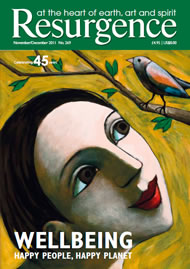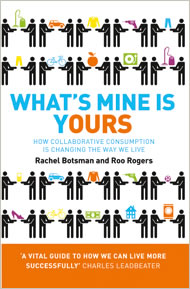Take a good look around your home. Examine the bookshelves. Take a peek inside the cupboard under the stairs. Look at the street outside. Rummage around in your kitchen drawers.
What did you find? Rachel Botsman and Roo Rogers, authors of What’s Mine is Yours: How Collaborative Consumption is Changing the Way We Live, already know the answer: unfulfilled opportunities, unexploited resources and potential income. Botsman and Rogers are the most optimistic and switched-on gold prospectors you are ever likely to come across.
Their idea is both simple and elegant: in our collective fever to buy and hoard ‘stuff’, we have forgotten how to share, barter, rent, swap and lend. In doing so, we have nurtured an economic system and culture that is staggeringly wasteful, environmentally damaging and, above all, indolent. But recent innovations and events, such as the development of ‘geo-tagged’ smart phones and the global crash of 2008, have given rise to a new phenomenon the authors describe as “collaborative consumption”.
“Collaborative consumption”, they explain, “is enabling people to realise the enormous benefits of access to products and services over ownership, and at the same time save money, space, and time; make new friends; and become active citizens again... Although the examples…range enormously in scale, maturity, and purpose, they share similar underlying principles essential to making them work…critical mass, idling capacity, belief in the commons, and trust between strangers.”
The book describes dozens of examples of collaborative consumption, but the ones that resonate the most are the simplest and closest to home. Websites such as Ecomodo, ParkAtMyHouse and TaskRabbit are exploiting the social connectivity provided by the internet and helping to redefine the terms ‘local’ and ‘neighbour’. Ecomodo lets people display online any “idling assets” they own – power drills, exercise bikes, lawnmowers, and so on – and offer them to anyone who would like to borrow or hire them. ParkAtMyHouse allows people to sell off-street parking to any bidder online. TaskRabbit lets people broadcast any task they need completing – such as dog-walking, decorating, computer repairs, weekly shop – to see if anyone is willing to undertake it for a fee or a favour. Each example is creating a brand new ‘local’ market, exploiting previously ignored resources and redefining what it means to be a neighbour.
The authors are predictably hard on the 20th century’s escalating culture of hyper-consumption, but they argue that through the rise of collaborative consumption the “disorder is fixable”. They make a very convincing case that, be it through forced necessity or a sense of awakening, we are now transitioning from ‘Generation Me’ to ‘Generation We’. And they argue that “the old stigmatised C’s associated with coming together and ‘sharing’ – cooperatives, collectives and communes – are being reinvented into appealing and valuable forms of collaboration and community.”
That the internet is bringing people together in ways that were previously unimaginable is not a fresh idea. The ability of the internet to surprise us is now utterly unsurprising. But the authors are at their most radical when they explore the unexpected potency of trust in enabling collaborative consumption. After all, why should we trust a complete stranger to follow through with a promise made on an online forum? It has been a familiar question since people started flogging things to each other on eBay more than a decade ago. Trust is both the glue and the lubricant that allow us all to collaborate online without a formal intermediary or gatekeeper. But why is this trust so rarely violated or abused?
Botsman and Rogers identify our “reputation capital” as being the currency that enables the whole system to thrive. The reason why everyone is largely confident to believe all those online, anonymous calls to “trust me” is that their “reputation capital” is on the line should the transaction fail in any way. Mess up, or abuse your position, and your all-important reputation will soon be ruined.
The authors believe that our online reputations are becoming so important to us now that there could soon come a time when our eBay ratings, Amazon reviews, and various other forms of online user rankings could be aggregated into one centralised “reputation bank account” that “will determine your access to forms of collaborative consumption and could become a more influential and valuable asset than your credit history”.
The book is both unsettling and reassuring in equal measure. Yes, it puts our current capitalist, consumer culture through the shredder; but it also lays out a very smart, uplifting, community-focused future at a time when it’s hard to isolate positives, given the bleak prognosis being repeatedly ladled to us elsewhere.
“We believe we will look back and see this epoch as a time when we took a leap and re-created a sustainable system built to serve basic human needs – in particular, the needs for community, individual identity, recognition, and meaningful activity – rooted in age-old market principles and collaborative behaviour,” conclude the authors. “Indeed, it will be referred to as a revolution, so to speak, when society, faced with grave challenges, started to make a seismic shift from an unfettered zeal for individual getting and spending toward a rediscovery of collective good.”








